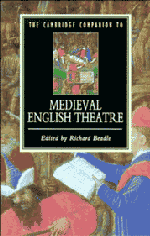Book contents
- Frontmatter
- 1 An introduction to medieval English theatre
- 2 The theatricality of medieval English plays
- 3 The York cycle
- 4 The Chester cycle
- 5 The Towneley cycle
- 6 The N-Town plays
- 7 The non-cycle plays and the East Anglian tradition
- 8 The Cornish medieval drama
- 9 Morality plays
- 10 Saints' plays
- 11 Modern productions of medieval English plays
- 12 A guide to criticism of medieval English theatre
- Select bibliography
- Continued Series List
- Index
3 - The York cycle
Published online by Cambridge University Press: 28 May 2006
- Frontmatter
- 1 An introduction to medieval English theatre
- 2 The theatricality of medieval English plays
- 3 The York cycle
- 4 The Chester cycle
- 5 The Towneley cycle
- 6 The N-Town plays
- 7 The non-cycle plays and the East Anglian tradition
- 8 The Cornish medieval drama
- 9 Morality plays
- 10 Saints' plays
- 11 Modern productions of medieval English plays
- 12 A guide to criticism of medieval English theatre
- Select bibliography
- Continued Series List
- Index
Summary
INTRODUCTION
I EGIPTIUS My lorde, grete pestelence Is like ful lange to last.
REX Owe, come pat in oure presence? Than is oure pride all past.
(Play II, lines 345-8)In chapter 12 of the book of Exodus, God's final vengeance upon the Egyptians for the enslavement of the children of Israel is the death of the firstborn. Called upon to mention the incident in the play of Moses and Pharaoh, a writer in medieval York chose to substitute 'grete pestelence' for the biblical episode, a striking alteration to the canonical source, for in later medieval England 'the grete pestelence' had come to be the customary way of referring to the Black Death of 1348-9. Upon hearing the grim words, the tyrannous and verbose Rex Pharaoh is immediately deflated, capitulates and orders the release of the Israelites – in performance, a moment of chill stasis after the pell-mell black comedy with which the reports of the preceding plagues of Egypt would probably have been presented. When the play was new, this may also have been a moment of remembrance for survivors of the Black Death and those born in the succeeding generation, for the York Hosiers' play of Moses and Pharaoh was probably composed when the memory of this, the most destructive of all the plague's visitations, was still a living memory. The earliest possible documentary reference to the existence of cycle drama in York dates to 1376, though our extant copy of Moses and Pharaoh was not set down until much later. In its subsequent career in the fifteenth and the first half of the sixteenth century the cycle changed in many ways, but there is no evidence to suggest that the Hosiers did other than bring forth the same pageant, more or less annually, through to the last recorded performances in the late 1560s.
- Type
- Chapter
- Information
- The Cambridge Companion to Medieval English Theatre , pp. 85 - 108Publisher: Cambridge University PressPrint publication year: 1994
- 2
- Cited by

